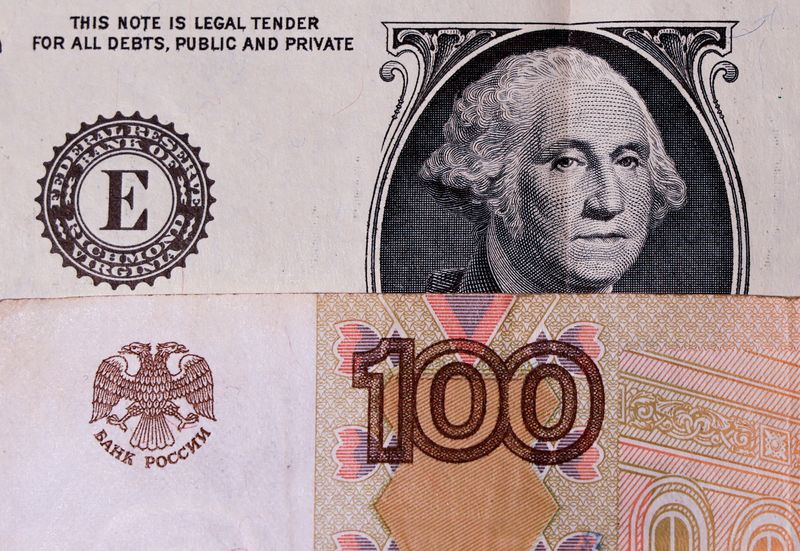MOSCOW (Reuters) -The rouble strengthened on Tuesday in volatile trade after the central bank hiked rates by 350 basis points to 12%, a move that was baked into market expectations after the bank called an emergency meeting to head off heavy currency losses.
The extraordinary rate meeting came after the rouble plummeted past the 100 threshold against the dollar on Monday and the Kremlin criticised the central bank's monetary policy.
The Kremlin said loose money policy was to blame for the weakening rouble, which has also been dragged down by the impact of Western sanctions on Russia's balance of trade as military spending soars.
The rouble gradually weakened after the decision, before firming late in the session after a Bloomberg report stating that the Russian government and exporters had discussed the reintroduction of capital controls before the rate hike.
By 1539 GMT, the rouble, which has lost more than a fifth of its value against the dollar since the Ukraine war began, was 0.9% stronger at 96.95 per dollar.
It reached a near 17-month low of 101.75 on Monday and briefly traded at 92.60 on Tuesday morning, swinging wildly as the market reacted to the central bank's sudden intervention.
It had gained 1.3% to trade at 106.05 versus the euro and firmed 1.1% against the yuan to 13.24.
"It is possible that additional measures are required to saturate the domestic market with foreign currency," said Olga Belenkaya of Finam brokerage. "That is, the central bank still has room for manoeuvre in tightening currency restrictions."
TURBULENT COURSE
The rouble has raced a turbulent course since Russia invaded Ukraine in February 2022, slumping to a record low of 120 against the dollar a month later before recovering to a more than seven-year high a few months later, supported by capital controls and surging export revenues.
While President Vladimir Putin has repeatedly hailed the resilience of Russia's $2 trillion economy, the strains of fighting the biggest land war in Europe since World War Two and what the West casts as the toughest sanctions in history are starting to bite.
The weakening rouble has pushed up prices for a host of everyday items ahead of a presidential election in March 2024, though higher interest rates would make life harder for borrowers, including companies and the government as it finances military operations in Ukraine.
"If the rouble rate shows some stabilisation and inflation does not show further acceleration, the regulator will keep the rate at 12% in September," said BCS Express analysts. "Otherwise, we can expect another 100-200 basis point step."
Brent crude oil, a global benchmark for Russia's main export, was down 1.8% at $84.62 a barrel.

Russian stock indexes, which hit a pre-invasion high on Monday, were mixed.
The dollar-denominated RTS index was up 0.8% to 1,017.8 points. The rouble-based MOEX Russian index was 0.2% lower at 3,124.1 points.